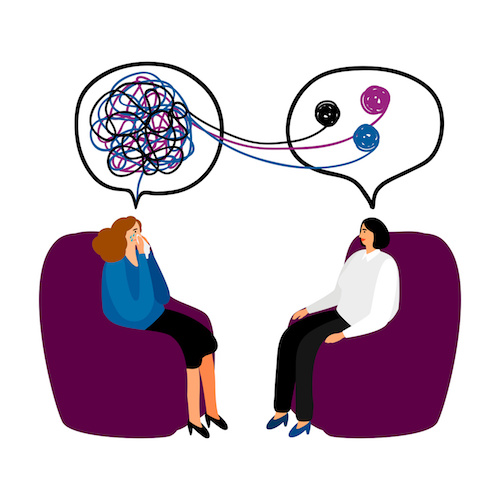What it is...and what it's not

Counselling and psychotherapy are powerful tools for mental health and personal growth. However, misconceptions about what therapy entails are common. Let's explore what therapy is and isn't...
(Before we start: Counselling typically focuses on present issues and is more short-term, while Psychotherapy tends to be longer-term and delves into deeper, underlying issues. However, there is significant overlap, and many therapists offer both depending on the client's needs.)
What is therapy?
At its core, therapy is a collaborative process between a trained mental health professional and a client. As Dr. Irvin Yalom, a pioneer in existential psychotherapy, emphasises: the therapeutic relationship itself is a key factor in healing. Therapy provides a non-judgemental space to explore thoughts, feelings, and experiences.
Cognitive Behavioural Therapy (CBT), developed by Dr. Aaron Beck, focuses on identifying and changing unhelpful thought patterns and behaviours. Marsha Linehan's Dialectical Behaviour Therapy (DBT) combines CBT with mindfulness and acceptance strategies. These approaches highlight that therapy is an active process of learning new skills and ways of thinking.
Jonathan Shedler, a proponent of psychodynamic therapy, stresses that effective therapy goes beyond symptom relief when appropriate (some people might attend therapy to reduce their symptoms). Put simply, psychodynamic therapy focuses on helping clients develop deeper self-understanding, healthier relationships, and build greater resilience. Therapy in this context is a process of self-discovery and personal growth.
It also offers a space for self-reflection and gaining new perspectives. Through the therapeutic process, clients can explore their patterns of thinking, feeling, and behaving. They can gain insight into how past experiences may be influencing their present and learn to make connections between seemingly disparate aspects of their lives.
Therapy also provides an opportunity to develop new skills in a supportive environment. Whether it's learning to communicate assertively, regulate emotions, or challenge negative self-talk, therapy offers a space to experiment with new ways of being. The therapist serves as a guide and ally, offering encouragement, feedback, and a different perspective when needed.
Ultimately, therapy is a deeply personal and unique experience. What it looks like will vary depending on the individual, their goals, and the therapeutic approach. At its heart, therapy is about exploring with clients how they can live more authentic, fulfilling lives.
What therapy isn't...
Contrary to popular belief, therapy isn't just a place to vent or get advice. While expressing emotions is important, therapy is more than a friendly chat. Therapists are trained to guide clients in gaining insight and making meaningful changes.
Generally, therapy isn't a quick fix (although some people might find a single session useful, depending on their needs). It's a process that requires commitment and effort from both the therapist and the client. Unrealistic expectations, such as hoping for immediate or miraculous results, can lead to disappointment.
For the most part, change takes time, and progress might not always be linear. For example, a client who comes to therapy to learn time management skills to improve their studies is likely to get what they need sooner than someone who is struggling with a much more complex problem.
Therapy isn't always comfortable. In fact, as change begins to take shape and issues are confronted, it's common to feel 'worse' before you feel 'better'. Exploring painful experiences or facing difficult truths can be challenging. However, as Irvin Yalom notes, confronting these discomforts is often necessary for growth and healing.
Lastly, therapy isn't a one-size-fits-all solution. What works for one person may not work for another. It's essential to find a therapist and approach that aligns with your needs and goals.
Realistic expectations
When starting therapy, it's important to have realistic expectations. Therapy can help you gain insight, learn coping skills, and make positive changes. However, it's not a magic wand that will instantly solve all problems.
Be prepared to actively engage in the process. Therapy requires openness, honesty, and a willingness to try new things. It's a collaborative journey where you and your therapist work together towards your goals. Therapists can guide their clients, but they can't do the client's work for them.
The power of therapy
While therapy isn't a magic cure-all, it can be incredibly transformative. As Shedler, Yalom, Beck, and Linehan have demonstrated through their work, therapy has the power to alleviate distress, foster personal growth, and improve overall well-being.
If you're considering therapy, remember that it's a brave and proactive step towards better mental health. With realistic expectations and a commitment to the process, therapy can be a valuable tool on your journey of self-discovery, healing, and living a life that feels authentically yours.




